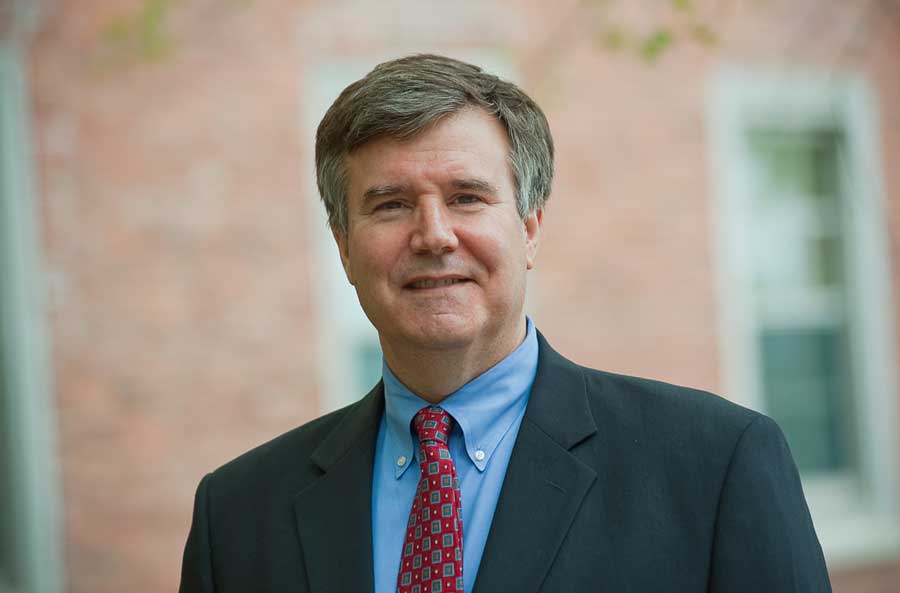Ellsworth lecture puts Syria in context
Gregory Gause
At the 30th Ellsworth Lecture on March 26, UVM Professor F. Gregory Gause presented “The New Middle East Cold War,” during which he attempted to put the complicated circumstances surrounding this civil war into perspective.
Over 140,000 people have died in the Syrian conflict so far, and the conflict in Syria remains resistant to any solution.
Gause is a professor of political science at UVM and a non-resident senior fellow at the Brookings Doha Center. Gause was chair of the Political Science Program at UVM for three years, a fellow for the Arab and Islamic Studies at the Council on Foreign Relations in New York in the early ‘90s, and a Fulbright Scholar at the American University in Kuwait in 2009.
The Ellsworth Lecture began with a welcome from Dean of Academic Affairs Dan Regan, followed by an introduction by Associate Professor of Political Science David Plazek. “When it comes to Syria, the last figure I saw was that 140,000 people had been killed,” Plazek said. “I think when you get to numbers that big you kind of lose focus on the idea that each one of those numbers is a person that had hopes and dreams, and I think it’s important to remember that.” Plazek also provided an outline identifying all of the major world powers involved in the conflict as well as the human tragedy in Syria, and its importance to all of us.
“To understand why the Syrian civil war has gone on as long as it has,” Gause said, “we have to understand the regional context in which it’s taking place, and that is what I’m calling ‘The New Middle East Cold War.’”
Gause explained that just as the Soviet Union and the U.S. struggled for influence over weaker countries, the same thing is going on within the Middle East right now. To fully understand Syria, he said, we must first understand the levels of influence involved.
According to Gause the main protagonists in the Middle East now are Israel, Iran, Qatar, Turkey, and Saudi Arabia, who are all vying for regional influence.
“What these countries are doing is playing into the domestic politics of states where governance is weak, and fragmented,” Gause said. “And societies are divided along sectarian, regional, ideological, and ethnic lines.” Gause said Syria is one of these states.
However, this is not the first Middle East cold war. Gause explained that in the ‘50s and ‘60s, Egyptian president Gamal Abdel Nasser worked to mobilize citizens of weak Middle Eastern states to go against their governments. Gause said that this cold war was the progressives versus the reactionaries, and today there are fights within the Sunni Muslim world, such as the Saudis being against the Muslim Brotherhood.
Gause said that because this is a cold war, there are paradoxes within it, including Qatar being more influential than Israel despite Israel’s overarching military.
Turkey and Saudi Arabia are also paradoxes because Turkey’s soft power of a more stable democracy does not contribute to supporting Syrian rebels like Saudi Arabia’s money. “Power is not exactly defined by how many tanks you have, how many planes are in your air force, and how big your army is,” Gause said. “Power is defined by your ability to support your clients in their own political domestic fights.”
As Gause continued to explain more about the regional conflicts between these nations, he pointed out that while this is seen as a sectarian fight between Sunnis and Shiites, if this were the case Saudi Arabia and the Muslim Brotherhood would be allies, but they’re not.
Gause noted that weakness or the breakdown of state authority invites regional intervention. For example, Lebanon and Yemen are historically weak states, and the Arab Spring opened up the grounds to Syria and Libya. Gause also said that we made Iraq a playing field for international intervention. “We, the United States, created one of these playing fields when we invaded Iraq in 2003,” Gause said. “We, as a matter of conscious policy, destroyed the Iraqi state; that was our intention, and we succeeded.” He said that although we hoped to build the state again, we failed and that building we’re better at destroying states than building them.
By destroying Iraq, we created a playing field that was once a historically strong state and opened it up to other countries. Gause explained that factors such as the Arab Spring playing fields are created, opening the gateway to the Middle East Cold War, and increasing regional conflict between countries not militarily but through diplomatic conflict. This is why the Syrian conflict has gone on so long, because each of the major players in the region has different political allies within Syria and outside.
As of right now, he said, Iran has the major advantage and they are the most able to take advantage of the playing fields throughout the region. This conflict continues because each one of these countries is playing for political and regional advantages. Because of this, thousands of Syrians are dying.
Gause closed the lecture by taking questions from the audience, which included topics such as Russia’s role within the Middle East, and the U.S. relationship with Iran in negotiating peace talks with Iran, and lifting the sanctions on it.
This year’s Ellsworth Lecture was enlightening, and brought with it a whole new understanding of the political and human strife within the region.
Ben Simone joined the Basement Medicine Staff in Spring 2014, assuming the position of staff reporter.



